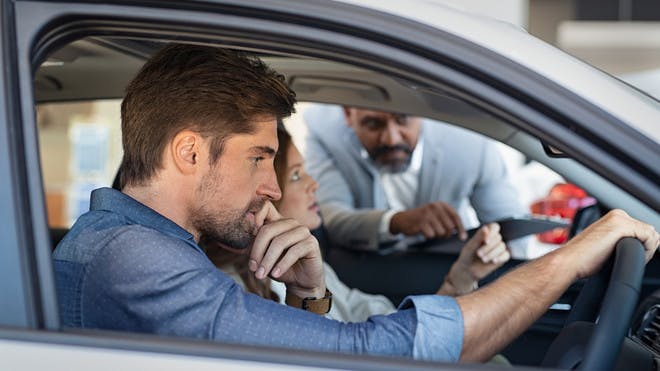Everything you need to think about when buying a car

Second only to buying a house, a car purchase could be the largest purchase you ever make, so picking the right one is critical not only to your bank balance but your lifestyle. It’s going to require quite a bit of research so we’ve gathered everything in one place that you need to think about to help you make the right choice.
Before making your final decision, try not to let your heart rule your head.
What to look for when buying a car - Top car buying considerations:
1. Work out a realistic budget. Over-extending yourself could leave you exposed later if the unexpected happens.
2. Consider the total cost of motoring - not just the ticket price. Fuel and insurance are two of the biggest costs, but depreciation (the difference between a car’s value when bought and sold) is the biggest. Some new cars depreciate by as much as 50% over their first three years.
3. If you’re using finance, such as Hire Purchase (HP) to buy your car, remember to budget for those monthly payments. Read our in-depthcar finance guide.
4. What car should I buy? cinch has a handy guide to help you work out what car is right for you. In a nutshell, don’t just focus on looks; consider the practicalities – size of car, number of seats, luggage space, body style (eg SUV, hatchback, estate).
5. Check the claimed fuel economy and CO2 emissions, which affect your fuel bills and your road tax (electric cars and plug-in hybrids are tax exempt).
6. Look up Euro NCAP crash safety test ratings (five stars are the best).
7. Check the car’s insurance group – the smaller the number, the lower the premium.
Buying a car
Now for the fun bit – it's time to find your next car. Millions of new and used vehicles are sold every year and there are also plenty of ways to find cars for sale such as right here on cinch.
Before making your final decision, try not to let your heart rule your head. Stick to your budget. Also, be prepared to shop around and haggle before you seal the deal.
If you're buying used, it's essential to have the car checked out before committing. Take a knowledgeable friend, relative or an independent expert along when your view the car and take it for a test drive.
Documentation and essential checks
Here’s all the paperwork you need to check:
- V5C registration document (also known as a logbook). Make sure that the car's unique vehicle identification number (VIN) matches the VIN on the V5C. Walk away if the details don't match.
- Service history details. The more detail the better. The less there is and it will have a negative impact on the car’s value.
- A valid MOT certificate (if the car is three years or over). This is proof that the car is roadworthy. Section 75 of the Road Traffic Act makes it an offence for anyone to sell a vehicle that is not roadworthy.
- Owner's manual – not a legal requirement, but it really helps when you're getting to know a car. Handbooks are an easy way to find tyre pressures and recommended engine oil, for instance.
A few essentials for when you pick up your new car:
- Before you drive off with your new car, walk around it carefully, checking all the body panels fit properly and for any signs of damage – and don’t forget the interior.
- Modern cars are packed with tech, so make sure you’ve had a good demonstration. Trying to find the lights when driving home on a motorway is dangerous.
- Do you have your insurance sorted? Do you have a copy of the warranty? Are you clear about service intervals and where the work needs to be carried out?
- Ensure that the new owner’s section of the V5C is filled out correctly, and that you take the relevant sections with you.
- Finally, get an invoice and sales contract showing that the balance has been paid and make sure you have both sets of keys.
Know your rights
Whether buying new or used, doing it through a dealer gives you more legal protection than buying privately, where cars are “sold as seen”:
- If you buy from dealer and something goes wrong, you have some statutory rights under the Consumer Rights Act 2015 because the vehicle must be of “satisfactory quality, fit for purpose and as described”.
- Additionally, something not widely known, but you have a right to reject a faulty car, entitling you to a full refund within 30 days of purchase in most cases.
- If a fault cannot be repaired or replaced within six months of buying a vehicle, then in most cases you should also be entitled to a refund.
It’s advisable to pay for all or part of the cost of the car using a credit card. That way the card company and the trader might be jointly responsible for compensating you under Section 75 of the Consumer Credit Act 1974 if something goes wrong.
Make searching and staying updated even easier.